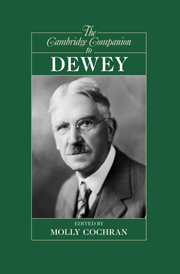Book contents
- Frontmatter
- Introduction
- 1 The making of a democratic philosopher: the intellectual development of John Dewey
- 2 Dewey’s epistemology
- 3 The naturalism of John Dewey
- 4 Dewey’s logic of inquiry
- 5 The primacy of practice in Dewey’s experimental empiricism
- 6 Cognitive science and Dewey’s theory of mind, thought, and language
- 7 John Dewey and action
- 8 Dewey’s moral philosophy
- 9 Ethics as moral inquiry: Dewey and the moral psychology of social reform
- 10 Dewey and pragmatic religious naturalism
- 11 Dewey’s aesthetics
- 12 Dewey’s philosophy of education: a critique from the perspective of care theory
- 13 Dewey’s vision of radical democracy
- 14 Dewey as an international thinker
- Bibliography
- Index
9 - Ethics as moral inquiry: Dewey and the moral psychology of social reform
Published online by Cambridge University Press: 28 September 2010
- Frontmatter
- Introduction
- 1 The making of a democratic philosopher: the intellectual development of John Dewey
- 2 Dewey’s epistemology
- 3 The naturalism of John Dewey
- 4 Dewey’s logic of inquiry
- 5 The primacy of practice in Dewey’s experimental empiricism
- 6 Cognitive science and Dewey’s theory of mind, thought, and language
- 7 John Dewey and action
- 8 Dewey’s moral philosophy
- 9 Ethics as moral inquiry: Dewey and the moral psychology of social reform
- 10 Dewey and pragmatic religious naturalism
- 11 Dewey’s aesthetics
- 12 Dewey’s philosophy of education: a critique from the perspective of care theory
- 13 Dewey’s vision of radical democracy
- 14 Dewey as an international thinker
- Bibliography
- Index
Summary
Because he consistently rejects the enterprise of traditional moral theory in its entirety, Dewey's own ethics is difficult to characterize. On the one hand, Dewey's endorsement of apparently theoretical statements, such as “judge an act by its consequences,” seems to make him a consequentialist, although not necessarily a utilitarian. When Dewey applies this methodological adage to moral philosophy itself, he seeks to show that moral theories inherently justify social hierarchy by endorsing claims to special access to moral knowledge as a justification of class domination. On the other hand, while Dewey unmasks moral philosophy as a means to social domination, he does not simply debunk moral knowledge as such. Instead he asks us to consider moral thinking and knowledge as empirical phenomena, to be understood primarily through social psychology and history. For this reason, when James Rachels wants to show the vitality of naturalism even after the challenge of Moore's naturalistic fallacy, he cites Dewey as the last “century's most influential naturalist.” In this respect, Dewey would clearly endorse naturalism as it is formulated by C. D. Broad: that “ethics is not an autonomous science,” but rather “a department or an application of one or more of the natural or historical sciences.”
- Type
- Chapter
- Information
- The Cambridge Companion to Dewey , pp. 187 - 210Publisher: Cambridge University PressPrint publication year: 2010
- 4
- Cited by



